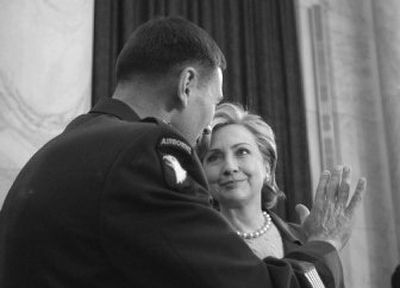Nominee says Iraq dire but not hopeless

WASHINGTON – President Bush’s nominee to be the next commander in Iraq, Army Lt. Gen. David Petraeus, told Congress on Tuesday that the situation there is dire and poses “tough days” ahead, but he pleaded for time to begin executing a new strategy.
Petraeus, a Princeton University Ph.D. who developed the Army’s counterinsurgency warfare manual, is expected to win Senate approval later this week. But as Petraeus fielded questions from senators of both parties about the deepening dilemma facing U.S. forces, he was forthcoming and occasionally blunt in his assessment of American odds in the war-torn country.
“The situation in Iraq is dire. The stakes are high. There are no easy choices. The way ahead will be very hard,” he said. “But hard is not hopeless.”
If confirmed as a replacement for Army Gen. George W. Casey, Petraeus would represent the first step in a military restructuring ordered by Bush as part of his new strategy to send in 21,500 additional U.S. troops. Navy Adm. William J. Fallon faces a hearing Jan. 30 to succeed retiring Gen. John P. Abizaid as commander of U.S. forces throughout the Middle East.
Petraeus has served two tours of duty in Iraq, first as commander of the 101st Airborne Division and then as the general overseeing the training of Iraqi forces. For the past 15 months, he has been the commanding general at Ft. Leavenworth, supervising much of the Army’s education system and developing the military’s war fighting doctrine, including the new counterinsurgency manual.
At Fort Leavenworth and in the pages of the Army’s academic journal, Petraeus has argued the most important goal in a counterinsurgency fight is making the population feel safe. And on Capitol Hill on Tuesday, Petraeus said that would be the cornerstone of the new strategy.
He said the sectarian violence in Baghdad amounted to “soft ethnic cleansing” and described the risks taken by ordinary Iraqi citizens every day as “incalculable.” The erosion of security, he argued, had become the primary challenge for the U.S. Rather than focusing on training the Iraqis, the priority would be improving security in Baghdad. The new strategy, he argued, was as important as additional forces.
“The objective will be to achieve sufficient security to provide the space and time for the Iraqi government to come to grips with the tough decisions its members must make to enable Iraq to move forward,” Petraeus said.
Skeptics of the surge latched on to the counterinsurgency manual, arguing that for every 50 people, one police officer or soldier is needed. Under that formula, securing Baghdad, a city of 6 million, would require at least 120,000 Iraqi and U.S. troops. By Petraeus’ count, once the additional U.S. forces arrive, there will be 85,000 U.S. and Iraqi troops in Baghdad.
“You wrote the book, general, but the policy is not by the book,” said Sen. Hillary Rodham Clinton, D-N.Y., a member of the committee and a presidential contender in 2008. “And you are being asked to square the circle, to find a military solution to a political crisis.”
Petraeus argued that the additional brigades flowing into Baghdad would double the number of U.S. forces in the city.
Despite Clinton’s attack on the Bush administration plan, she said she would support Petraeus’ nomination.
“The president is going forward with the policy; the debate is academic,” Clinton said outside the hearing room. “I want the very best leadership for the young men and women who will be implementing this strategy, and I have no doubt Gen. Petraeus is the person to try and pull this off.”